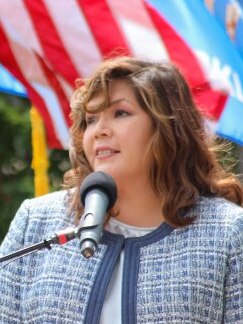Cherokee delegate to the United States House of Representatives facts for kids
Quick facts for kids Cherokee people's at-large congressional district |
|||
|---|---|---|---|
| Delegate |
|
||
| Ethnicity |
|
||
The Cherokee delegate to the United States House of Representatives is a special representative for the Cherokee people. This position was first created by a very important agreement called the Treaty of New Echota in 1835. The idea was for this delegate to speak for the Cherokee people in the U.S. government. They would help with talks about land and the Cherokee Nation's right to govern itself.
After 1835, the position was empty for a very long time. Then, in 2019, Kimberly Teehee from the Cherokee Nation was chosen for the role. She and the Cherokee leaders have been working to get her officially seated in the U.S. Congress. In 2021, another group, the United Keetoowah Band of Cherokee Indians, also named their own delegate, a lawyer named Victoria Holland.
Contents
What is a Cherokee Delegate?
A delegate is like a special representative. The Cherokee delegate would speak for the Cherokee people in the House of Representatives. This is one part of the U.S. Congress. The delegate would be a non-voting member. This means they can join discussions and share ideas but cannot vote on laws.
Why was this position created?
The right for the Cherokee to have a delegate comes from old treaties. Treaties are formal agreements between nations. The Treaty of Hopewell in 1785 first mentioned this right. It was confirmed again in the Treaty of New Echota in 1835. Another Native American tribe, the Choctaw, also has a similar right from their Treaty of Dancing Rabbit Creek in 1830. These treaties said that Congress should make a way for these delegates to join. However, the U.S. Congress never officially created a process for them.
Early History of Delegates
Even though Congress didn't make a formal process, the Choctaw tribe did send a representative to Washington for many years in the 1800s. This person acted like an ambassador, speaking for their tribe to the U.S. government. A famous example was Peter Pitchlynn.
The very first treaty between the U.S. and a Native American nation was with the Lenape (also called the Delaware Nation) in 1778. This Treaty of Fort Pitt encouraged them to form a state and have a representative in Congress. But it's not clear if this meant a delegate without becoming a U.S. state.
Modern Efforts to Seat a Delegate
In 2019, the Cherokee Nation officially announced they would appoint a delegate. They chose Kimberly Teehee, who was their vice president of government relations. For her to be officially seated, the House of Representatives needs to vote to accept her.
Concerns and Discussions
Some leaders in Congress have wondered if a delegate should be chosen by a tribal government instead of being elected by tribal members. Kimberly Teehee and the Cherokee Nation leaders explain that the Cherokee Nation is a sovereign nation. This means it has the right to govern itself. They believe her appointment is like sending an ambassador from one nation to another. This idea fits with how Native American representatives have worked in Washington before.
Delays and Recent Steps
Kimberly Teehee's seating in the House was delayed. The COVID-19 pandemic was one reason. In September 2022, the Cherokee Nation again asked Congress to seat her. A special meeting was held by the United States House Committee on Rules in November 2022. They discussed the legal steps needed to seat Teehee. After this meeting, several members of the House supported seating her soon.
Multiple Delegates?
While Kimberly Teehee represents the Cherokee Nation, another group, the United Keetoowah Band of Cherokee Indians, chose Victoria Holland as their delegate in 2021. They believe they also represent the Cherokee people mentioned in the Treaty of New Echota.
There is a third federally recognized Cherokee tribe, the Eastern Band of Cherokee Indians (EBCI) in North Carolina. They have not yet named a delegate. They have spoken with members of Congress about the idea of having their own representative.
Delegates Representing the Cherokee
| Delegate | Tribe | Party | Term | Congress | Electoral history |
|---|---|---|---|---|---|
| December 29, 1835 – August 29, 2019 | 24th–116th | Vacant | |||
|
Kimberly Teehee |
Cherokee Nation | Democratic | August 29, 2019 – present | 118th |
Appointed by Chuck Hoskin Jr. in August 2019 and approved unanimously by committee. Teehee was not seated during the 116th Congress. |
| Victoria Holland | United Keetoowah Band of Cherokee Indians | 2021–present | Appointed by committee in 2021. Holland has not been seated in the 117th Congress. | ||
 | Jackie Robinson |
 | Jack Johnson |
 | Althea Gibson |
 | Arthur Ashe |
 | Muhammad Ali |


